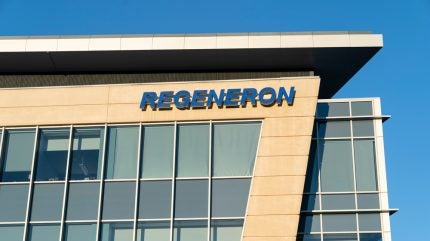
Regeneron has released encouraging trial results for its multiple myeloma antibody, linvoseltamab.
The data from the Phase I/II LINKER-MM1 (NCT03761108) study was presented at the European Hematology Association (EHA) Congress 2024 in Madrid, Spain, on 13–16 June.

Discover B2B Marketing That Performs
Combine business intelligence and editorial excellence to reach engaged professionals across 36 leading media platforms.
The 14-month follow up data demonstrated a 71% objective response rate, with 50% of patients achieving a complete response or better and 63% achieving a very good partial response or better, as determined by an independent review committee.
The median overall survival (OS) for all patients was 31 months, while the median progression free survival (PFS) was not reached. Among responders, the median duration of response (DoR) was 29 months.
Linvoseltamab is a BCMA and CD3-targeting bispecific antibody. It was developed using Regeneron’s VelociGene and VelocImmune platform technology.
In an interview with Clinical Trials Arena, Suzanne Lentzsch, a trial investigator, highlighted that this treatment offers convenience compared with other bispecific antibody therapies. “In contrast to the currently existing treatments, where [a patient] stays five or eight days in the hospital, patients can be discharged and just admitted for one day [with linvoseltamab]. So, there is a lot of patient convenience,” she said.

US Tariffs are shifting - will you react or anticipate?
Don’t let policy changes catch you off guard. Stay proactive with real-time data and expert analysis.
By GlobalDataWhen explaining the adverse events from the study, Lentzsch, who is also the director of the multiple myeloma and amyloidosis programme at Columbia University, compared bispecific antibodies to cell therapies. There are two cell therapies approved for the treatment of multiple myeloma: Bristol Myers Squibb’s Abecma (idecabtagene vicleucel; ide-cel) and Janssen’s Carvykti (ciltacabtagene autoleucel; cilta-cel). However, these cell therapies are known to cause cytokine release syndrome (CRS), a severe immune reaction.
“We know that the bispecifics have a much lower rate of CRS. We saw that the CRS occurred in 46% of the patients, but they only saw a Grade 1 and 2 (CRS events). Grade 3 CRS occurred in only 1% of the patients,” said Lentzsch. The low-grade CRS events did not lead to discontinuation of treatment, she added.
Regeneron said that the therapy is under review by the US Food and Drug Administration with a target action date of 22 August. The European Medicines Association (EMA) is also reviewing the drug’s approval application.
According to a report on GlobalData’s Pharma Intelligence Center, the multiple myeloma market will generate $21.6bn in 2027 in the eight major markets of China, France, Germany, Italy, Japan, Spain, the UK and the US.
GlobalData is the parent company of Clinical Trials Arena.
Update: The fourth paragraph was updated to reflect the correct secondary endpoint data. An earlier version stated the endpoints were not met.





